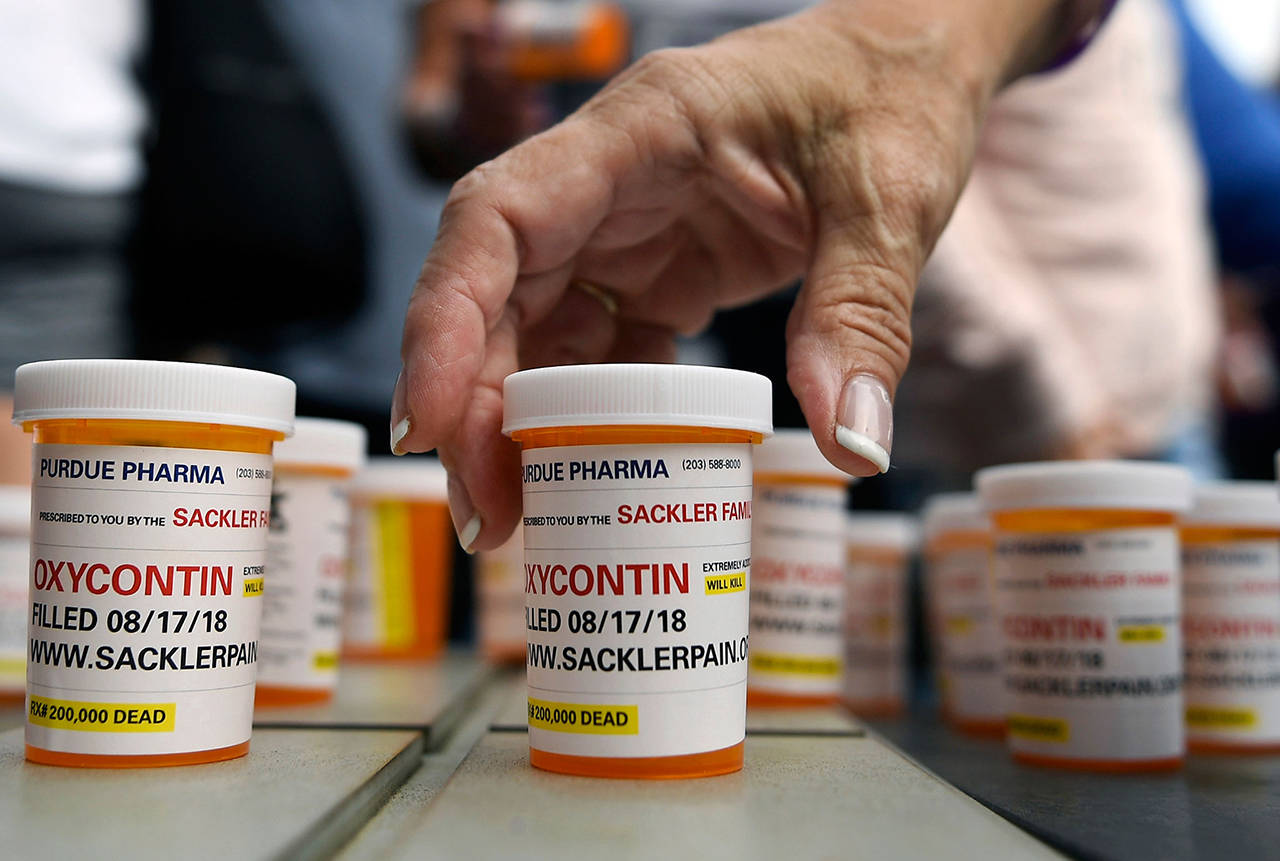EVERETT — A court verdict halfway across the country last week bolsters the legal quest to recoup damages from opioid abuse closer to home that has created a public health crisis and left a trail of death, crime and human suffering, local officials said.
In the the first opioid case to make it to trial, an Oklahoma judge on Monday ordered Johnson & Johnson to pay $572 million after finding that the consumer products giant and its subsidiaries helped fuel an addiction crisis in the Sooner State. The ruling might hint at possible outcomes for thousands of state and local government lawsuits nationwide. Those suits include legal complaints that the city of Everett, Snohomish County and the state of Washington have filed against OxyContin maker Purdue Pharma.
“The court’s verdict against Johnson & Johnson provides further validation of Everett’s claims and serves as another milestone amid the various efforts to hold Purdue and the other defendants — including Johnson & Johnson — accountable for their egregious misconduct,” the city said in a statement this week.
The pharmaceutical companies are expected to appeal the Oklahoma ruling. Johnson & Johnson said it responsibly promoted its prescription opioid medicines.
“The opinion in Oklahoma does not have a binding impact on other courts, nor will it impact how the company approaches other matters given the different laws, defendants and claims in other cases,” Jake Sargent, a company spokesperson, said in an email.
Oklahoma accused the companies of creating a public nuisance when they engaged in false and misleading marketing of their drugs. The claim of a public nuisance is similar to the claims in Everett’s lawsuit, according to the city.
Everett initially filed its complaint against Purdue Pharma in Snohomish County Superior Court back in January 2017. It was later joined with more than 2,000 other lawsuits and transferred to federal court in the Northern District of Ohio. Lawsuits by Snohomish County and the Tulalip Tribes are being handled as part of the same process.
Earlier this year, Everett added several new defendants to its complaint. They included Johnson & Johnson and its subsidiary Janssen, along with McKesson, Rite Aid, Walgreens and Walmart. The suit also targets several local doctors and clinics.
These Everett-based clinics, physicians and pharmacies are accused of enabling and failing to prevent the illegal diversion of OxyContin. The activity is blamed for contributing to overdose deaths and street crime. OxyContin has addictive qualities on par with morphine. The demand it created among people who became addicted contributed to rampant use of heroin and other opioids, local officials have argued.
Purdue has denied the allegations.
“The judge has issued a gag order regarding any settlement discussions. We are not able to comment on the news reports concerning a settlement proposal by Purdue,” Kimberley Cline, Everett’s communications director, said in an email.
Snohomish County Prosecutor Adam Cornell said the same thing Wednesday.
Washington Attorney General Bob Ferguson’s staff was preparing their case in a different venue: King County Superior Court.
“While Washington’s case against Purdue Pharma is different than Oklahoma’s case in Johnson & Johnson, we’re certainly encouraged by the court’s decision,” Ferguson said in a statement. “The Oklahoma case demonstrates that the courts are willing to hold drug manufacturers accountable for their role in causing the opioid epidemic.”
Ferguson confirmed that his team is part of the executive committee in legal negotiations with Purdue, but they were unable to discuss any details.
Following the Oklahoma verdict, the OxyContin maker was reportedly negotiating a $12 billion settlement involving the thousands of plaintiffs.
National media outlets described a proposal in which the Sackler family that owns Purdue Pharma would contribute $3 billion of their own money toward a settlement. The company would file for Chapter 11 bankruptcy and transform itself into a “public beneficiary trust,” with all profits from drug sales going to the plaintiffs, The New York Times reported Wednesday. It said a document outlining the tentative agreement was described to the newspaper.
Also, Purdue Pharma would supply its addiction treatment drugs free to the public, and the Sacklers would sell another pharmaceutical company, Mundipharma, which would add $1.5 billion to the settlement, according to the Times.
The Associated Press contributed to this report.
Lizz Giordano: 425-374-4165; egiordano@heraldnet.com. Twitter: @lizzgior.
Talk to us
> Give us your news tips.
> Send us a letter to the editor.
> More Herald contact information.

























